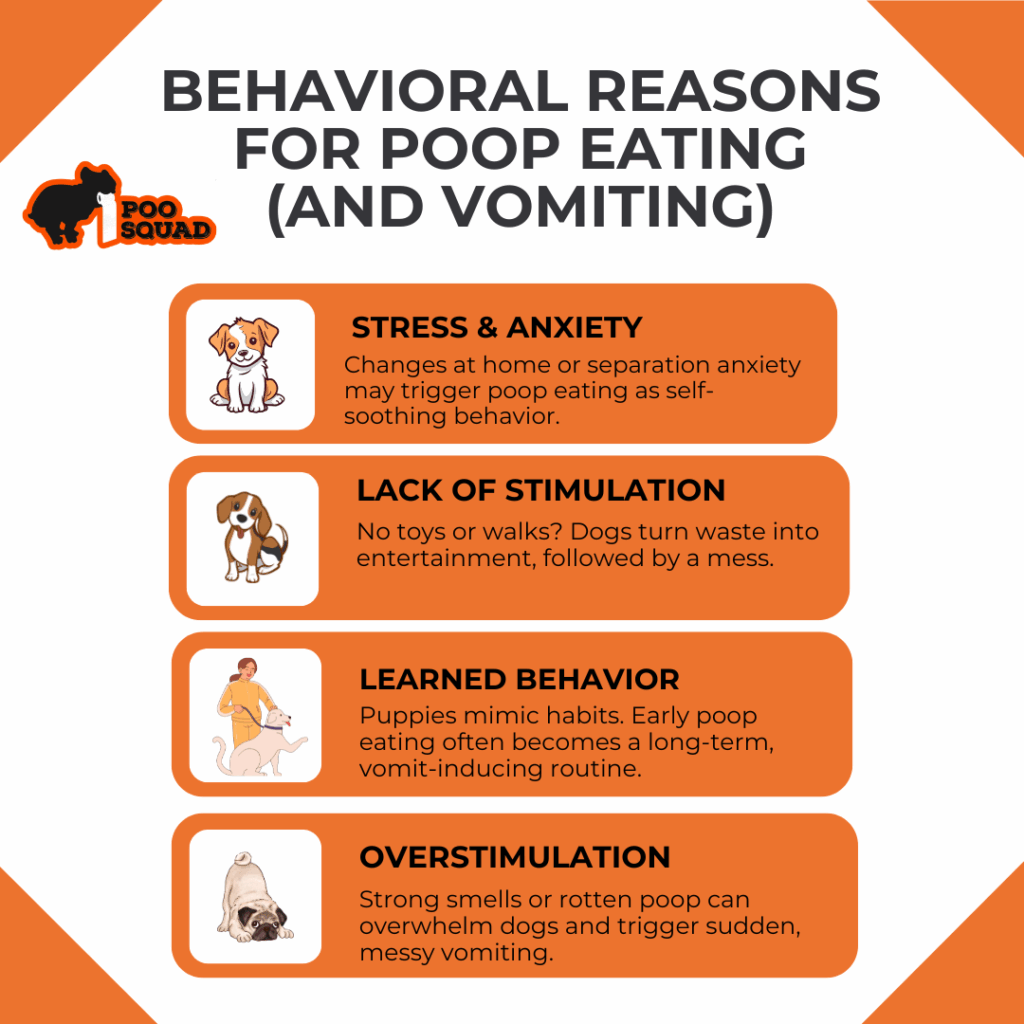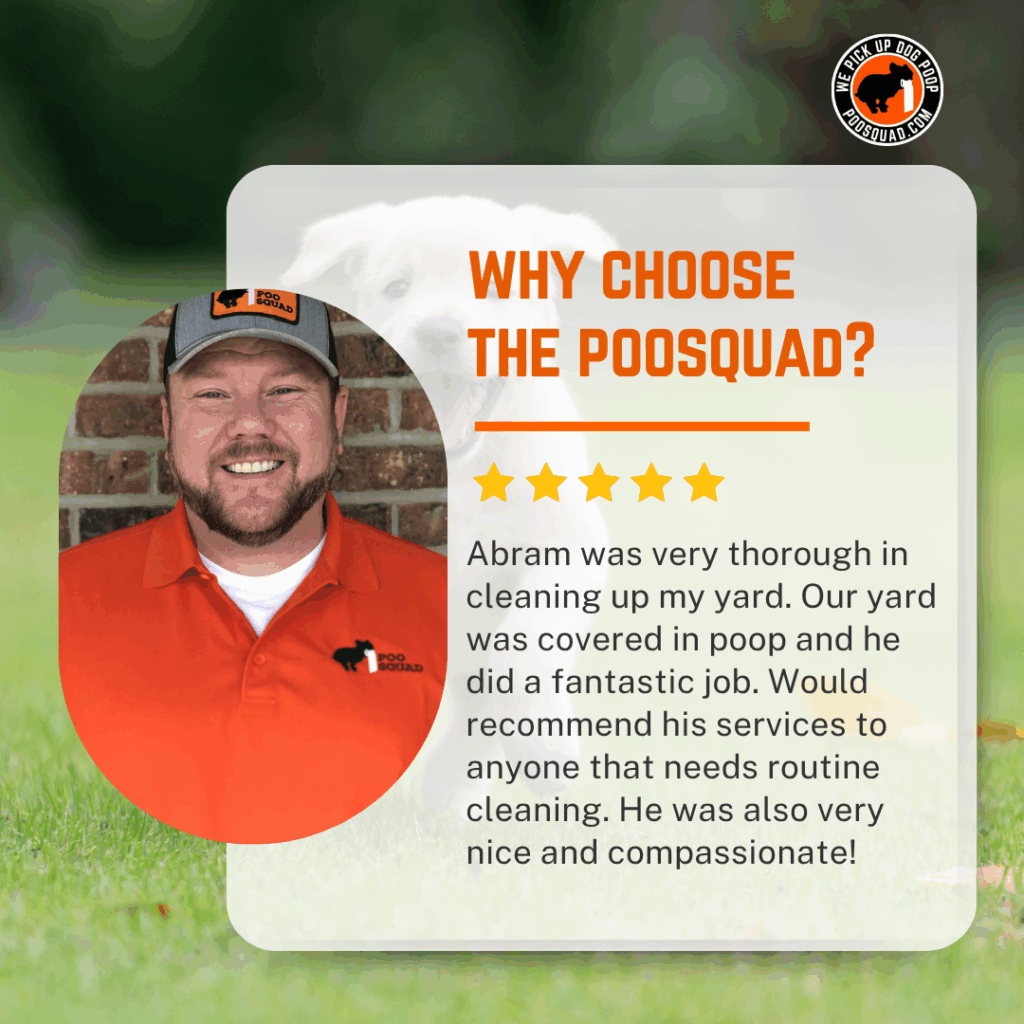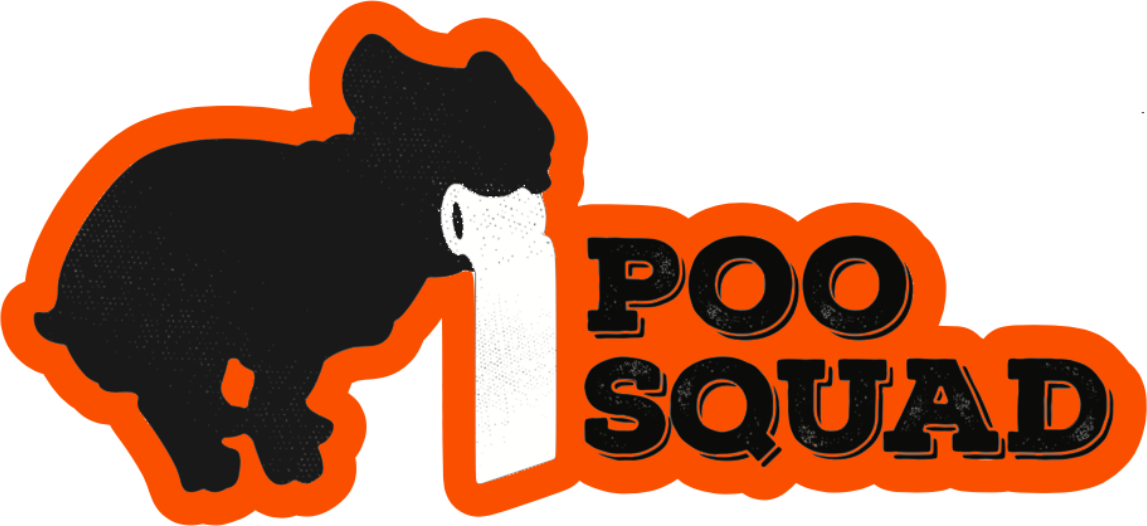If your dog ate poop and is now vomiting, it could be a sign of stomach irritation, parasites, toxin exposure, or nutritional imbalance. One-time vomiting may pass, but repeated episodes can signal infection or digestive distress, especially if paired with lethargy, diarrhea, or a swollen belly. Dogs that ingest old or contaminated feces are more likely to suffer GI upset or parasite transmission.
To respond quickly and reduce risk:
- Remove all poop from the yard or home to prevent re-ingestion
- Monitor for symptoms like repeated vomiting, dehydration, or appetite loss
- Offer bland food if stable after 6–8 hours
- Schedule a fecal test to check for parasites
- Disinfect contaminated areas and pet items
- Reassess diet for enzyme or nutrient gaps
- Use supervision and training to interrupt future poop-eating
This guide outlines what the vomiting may mean, when to call a vet, and how to break the cycle of poop-eating with safer sanitation, better nutrition, and behavioral fixes.
Is It Dangerous If My Dog Eats Poop and Throws Up?
In many cases, a dog vomiting after eating poop is the body’s way of saying “something’s not right.” It might be harmless, like a bit of stomach irritation, or it could signal something far more serious, like parasites or toxic contamination. The key is to look beyond the gag factor and pay close attention to your dog’s symptoms.

Here’s how to tell when vomiting is a gross hiccup, and when it’s time to take immediate action.
Signs This Might Be an Emergency:
- Vomiting multiple times in one day
- Vomit that smells like feces or contains visible stool
- Bloating or a hard belly
- Shaking, weakness, or collapse
- Diarrhea mixed with vomit
- Loss of appetite or energy
If any of these symptoms show up, call your vet. Fast. Fecal ingestion can introduce harmful bacteria or toxins that spiral quickly without treatment.
What It Could Mean (And What It Doesn’t)
Not all vomiting is created equal. Some dogs throw up once and bounce back. Others seem fine and then tank hours later. That’s why we always advise watching your dog closely for the next 24 hours after a poop incident.
One of the lesser-known risks is that poop left in your yard can fester, collect bacteria, or attract parasites, all of which get passed on when your dog sniffs or eats it. If this happens frequently, it’s worth considering a professional yard sanitization service to protect your pet long-term.
Medical Reasons Dogs Vomit After Eating Poop
When a dog eats poop and throws up, it’s more than a behavior issue; it could be a red flag from the inside out. Behind the grossness might be something as simple as dietary imbalance, or as serious as an infection that needs treatment right away.

Let’s break down the most common medical causes behind this unpleasant combo.
1. Parasites That Mess With the Gut
Eating poop, even their own, can transmit parasites like Giardia, roundworms, or hookworms. These freeloaders wreak havoc on your dog’s digestive system, leading to vomiting, diarrhea, and major discomfort. If your pup’s stool has suddenly changed color or texture, or they’re throwing up regularly, get a fecal exam done. It’s one of the fastest ways to uncover a hidden problem.
2. Toxic or Medicinal Contamination
Sometimes dogs don’t only eat poop, they eat contaminated poop. If another pet in the house is on medication or special diets, their waste can carry chemicals your dog’s body is not ready to handle. Vomiting is often the first reaction. This is especially dangerous if your dog raided a litter box. We hear about this all the time from families juggling multiple pets in one space.
3. Pancreas or Liver Problems
If your dog frequently eats feces and vomits afterward, it might be more than a bad habit. Dogs with pancreatic insufficiency or liver disease sometimes crave unusual things, including poop. A vet can run a quick blood test to see if these organs are doing their jobs properly.
4. Intestinal Blockages
This one’s especially common in “poocassos”, dogs that eat socks, crayons, or other household surprises. When mixed with poop, that junk can create a blockage that causes vomiting, straining, or even collapse. If your dog’s belly seems tight or they haven’t pooped in over a day, don’t wait. This is one of the rare times when a poop pickup delay could lead straight to the ER.
Nutritional Deficiencies and Dietary Triggers
Sometimes the problem is not what your dog ate, but what they’re not getting. A poor diet can trigger weird cravings, including poop. When your pup’s food doesn’t meet their nutritional needs, their body starts looking for nutrients wherever it can, even in the backyard buffet.
Here’s how diet plays a role in both coprophagia and vomiting.
1. Lack of Digestive Enzymes
If your dog’s food is too processed or lacks natural enzymes, they may not fully digest their meals. The undigested bits pass into their stool, and some dogs circle back to finish the job. Unfortunately, this often ends with a stomach revolt. In cases like this, enzyme supplements (recommended by your vet) can reduce the craving and protect your pup’s gut.
2. Protein and Fat Deficiencies
Dogs need animal protein and healthy fats to thrive. If their diet is too low in these macronutrients, poop can smell like a nutritional jackpot. Sadly, it’s also a bacterial landmine. Dogs with unbalanced diets are more likely to vomit after scavenging waste.
3. Irregular Feeding Schedules
When dogs go too long without food, they might “self-serve.” We’ve seen pups gobble poop in the morning because they missed dinner the night before. Regular feeding times help reduce desperate eating behaviors.
Pro Insight from the Field
We’ve seen firsthand how dog owners miss early signs of poor digestion because they never see the poop. That’s why our commercial dog waste removal service is more than cleanup. It’s peace of mind for property managers and pet parents alike, ensuring that changes in your dog’s waste don’t go unnoticed.
Behavioral Reasons for Poop Eating (and Vomiting)
Not every case of poop-eating is about hunger or sickness. Sometimes, it’s your dog’s brain, not their belly, driving the behavior. And in many cases, vomiting is simply the stomach’s reaction to a habit that shouldn’t have started in the first place.

Let’s look at the psychological triggers behind poop snacking and why it might be happening now.
1. Stress and Anxiety
Dogs under stress, whether from a new baby, a move, or separation anxiety, often act out in strange ways. Eating poop is one of them. It’s soothing for some, even if it’s a hygiene nightmare for you. The gut may reject it, but the behavior is a form of coping.
2. Boredom and Lack of Stimulation
When dogs don’t have enough to do, they’ll find something… and sometimes, that something is disgusting. A dog left alone in a poop-filled yard with no toys or walks might end up turning waste into entertainment, which can quickly turn into a vomit-filled cleanup.
3. Learned Behavior
Puppies sometimes mimic what they see, from other dogs or the scent trails of their past habits. If poop-eating starts young and is not corrected, it often persists into adulthood. Unfortunately, it doesn’t always end with only a snack; it can result in vomiting and long-term gastrointestinal sensitivity.
4. Overstimulation or Confusion
One of the more overlooked causes is sensory overload. Dogs that encounter strong smells (like another animal’s feces or rotting material) might get overstimulated and throw up immediately after engaging with it. That’s especially true for “poocassos,” the creative pups who treat the backyard like a buffet of textures.
If your dog is left to roam a yard full of old waste, the odds of behavior-based vomiting go up. One of the easiest ways to stop the cycle is to eliminate temptation. A recurring yard clean-up service ensures no old surprises are lying around for your dog to sniff, eat, or regret.
What to Do Immediately If Your Dog Eats Poop and Vomits
When your dog throws up after eating poop, it’s hard not to panic. You’re grossed out, confused, and wondering if this is a one-time fluke or the start of something serious. Good news: you don’t have to guess. A few key actions can make all the difference between a quick recovery and a trip to the emergency vet.
Step 1: Remove Access to More Poop
Clean the yard, close the litter box, and check your home for hidden piles. Even one more bite can send their stomach spiraling all over again. We recommend setting a consistent poop pickup schedule to prevent repeat incidents, something our residential scoopers handle for many clients who’ve been through this once and never want a repeat.
Step 2: Monitor for Dehydration or Lethargy
A single vomit may not be serious, but if your dog is tired, refusing water, or shows signs of dry gums or a tight belly, call your vet. Dehydration sneaks up fast and turns simple problems into emergencies.
Step 3: Offer a Bland Meal (If They’re Stable)
If the vomiting has stopped for 6–8 hours and your dog seems alert, you can offer a small amount of boiled chicken and white rice. Skip the treats, bones, and anything fatty. Keep it boring. Your goal is to soothe the stomach, not reward the behavior.
Step 4: Schedule a Fecal Test
Even if things seem better, it’s smart to check for parasites. A fecal test is quick, relatively cheap, and can reveal hidden infections that triggered the whole episode in the first place. If your dog has been vomiting on and off for a while, don’t wait.
Step 5: Disinfect the Area
Clean any surfaces they may have vomited on, including their bed, toys, and your rugs. Use pet-safe disinfectants, and toss anything contaminated by litter, feces, or vomit. This helps prevent reinfection and reduces the chance of other pets getting sick.
How to Stop This Behavior for Good
Poop-eating is not only disgusting, it’s a stubborn habit. And once your dog gets a taste (literally), they might keep going back unless you make intentional changes. Fortunately, stopping it for good is possible with the right combination of supervision, cleanup, and training.

1. Clean Up Every Poop, Every Time
We can’t stress this enough. The more poop there is in your yard, the more chances your dog has to snack. And the older the pile, the more likely it is to carry bacteria or parasites. If you can’t stay ahead of the mess, a routine cleanup plan makes this easy. We don’t scoop, we sanitize between yards to stop germs from spreading.
2. Evaluate Their Diet
Talk to your vet about possible nutrient deficiencies. In some cases, simple changes like switching to a higher-protein food or adding a digestive enzyme can make a big impact. Feeding times should be consistent, too, no skipped meals or free-for-alls.
3. Block Access to Temptation
Cover litter boxes, monitor outdoor time, and supervise closely after walks. If your dog tends to go on poop patrol the second you turn around, a temporary basket muzzle (used with care) can prevent ingestions while you work on training.
4. Reinforce Positive Behavior
When your dog ignores poop or walks away, celebrate like they won a gold medal. Praise, treats, and redirecting their attention work better than yelling or punishment. A confident, calm “leave it” goes a lot further than a scolding.
5. Use Safe, Taste-Based Deterrents (If Needed)
Some pet parents have success using products that make poop taste terrible, though, to be fair, we thought poop already had that covered. These are typically added to food and require consistency, so talk with your vet about whether it’s right for your pup.
Common Myths and Mistakes to Avoid
When your dog eats poop and throws up, the internet loves to offer every solution under the sun, most of them wrong. Before you buy into backyard gossip or outdated advice, here are a few myths that need to be scooped once and for all.
Myth 1: “Dog poop makes great fertilizer.”
Nope. Dog poop is acidic, packed with harmful bacteria, and kills grass over time. Unlike cow or composted manure, dog waste doesn’t break down cleanly and can leach into soil and waterways. If you’re mowing over it and calling it mulch, your dog and your lawn deserve better.
Myth 2: “Only lazy dog owners pay someone to pick up poop.”
This one makes our blood boil. Our customers aren’t lazy, they’re busy, they care about sanitation, and many are parents, seniors, or folks with mobility challenges. Poop pickup is not a character test. It’s one more thing off your plate so you can focus on what matters.
Myth 3: “All dogs eat poop. It’s normal.”
Some puppies go through a phase, yes. But regular coprophagia paired with vomiting is a red flag. It could signal stress, diet issues, or a medical problem. Brushing it off as “just a phase” can delay important care your dog might need.
Myth 4: “It’s gross but harmless”
Even a healthy-looking pile can be teeming with parasites or contain remnants of medications from another pet. One bite can be all it takes to trigger vomiting, infection, or a vet visit you didn’t plan for.
Mistake: Waiting too long to act
Many dog owners try to wait it out or assume it’ll fix itself. Meanwhile, the behavior gets worse, or health issues go unchecked. If you’re noticing a pattern, take action now. Whether it’s scheduling a vet visit or bringing in our pooper scooper pros, small steps today prevent big problems tomorrow.
How We Can Help

We’ve seen it all, from poop-hunting puppies to seasoned “waddling bandits” leaving landmines all over the yard. And when it ends with your dog vomiting, it’s more than a mess; it’s a moment where you wish someone else had already handled the problem. That’s where we come in.
Our team shows up in bright orange, so you always know who’s in your yard and why. We offer more than waste removal; we sanitize our tools between every stop, triple-check gates for safety, and arrive with automated reminders so you’re never caught off guard. It’s not only a convenience. It’s peace of mind.
For pet parents with packed schedules, mobility concerns, or homes with curious pups and toddlers, keeping the yard poop-free is not optional; it’s essential. Whether you’re looking to protect your dog from getting sick again or you want to avoid another Sunday morning surprise, our residential poop pickup service has you covered.
We’re in this to make your life easier and your yard a whole lot cleaner.
